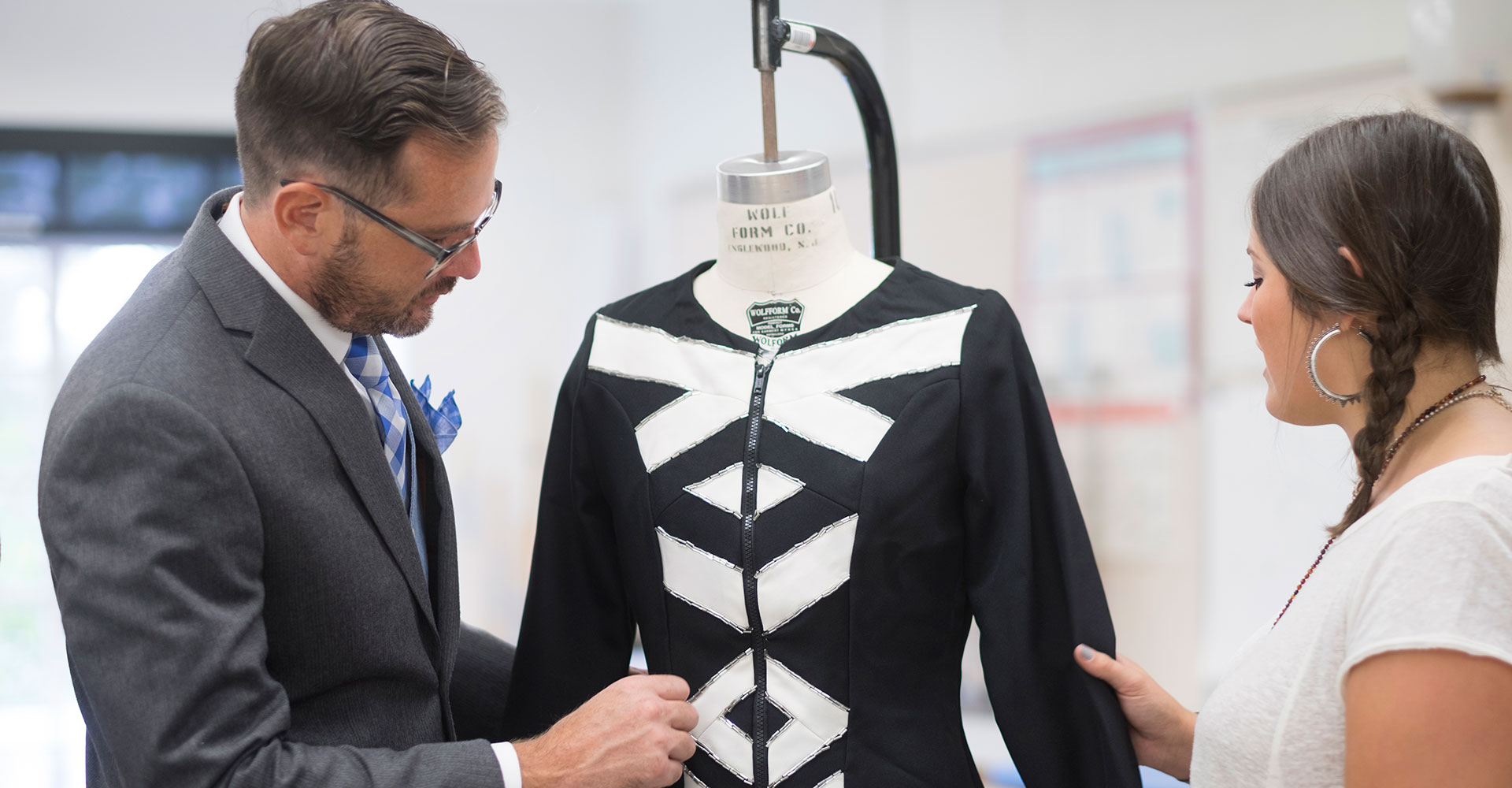Fashion Design & Merchandising
This program is designed to provide students with an understanding of fashion and textile industries, consumer behavior, product development, business principles, and technology applications.
Concentrations
Students concentrate in one of two areas
Design and Product Development
Design and Product Development emphasizes the total design and production process from inception to finished product and its ultimate sale to the consumer. Specialized labs and industry software provide students with extensive hands-on experience in the latest design, product development, and fashion retailing technology applications.
Design and Product Development Curriculum
Merchandising
Merchandising combines an overview of the fashion industry, consumer behavior, product development, planning, buying business operations and entrepreneurship.
Merchandising Curriculum
Accelerated Program
The Fashion Design and Merchandising major offers an accelerated program to earn both a bachelor's and master's degree in a shorter length of time. Students in the Accelerated Program take graduate-level courses and earn both undergraduate credit and graduate credit simultaneously. Students need to consult with a potential graduate advisor to ensure graduate credit could be applied to a program of study for the graduate degree. Applications to these programs are submitted in the junior year (i.e., after completion of 60 or more hours of graded undergraduate courses).
Careers
- Apparel Manufacturer
- Area Sales Manager
- E-Commerce Business Owner
- Extension Specialist or Agent
- Fashion Consultant / Stylist
- Fashion, Costume, Accessory, or Technical Designer
- Fashion Forecaster
- Fashion Journalist
- Manufacturer's Representative
- Merchandise Manager
- Product Developer
- Professor, Instructor, or Teacher
- Retail Buyer / Analyst
- Store Manager or Business Owner
- Textile Scientist
- Visual Merchandiser / In-Store Display
Conferences and Collections
Sustainability Conference
Generations X, Y, and Z share an overwhelming belief that all of us need to work together to change our world, and they are voting with their purchases. From fiber sourcing to end product, stakeholders and consumers alike are demanding transparency in measuring and reducing the environmental and social impact of textile products. View presentations from the 2020 Sustainability Conference.
Exhibits and Collections
- Center for Retail and Cotton Product Development
- Fashion A to Z: Selections from the MSU Historical Costume and Textiles Collection
- Historic Costume and Textiles Collection
- Plaids, orints, and Peacocks... Oh My!
Bully Tartan
 The Bully Tartan, a design by alumna Elizabeth Costa that celebrates the university’s beloved live mascot, now is registered officially with the Scottish Register of Tartans. The Bully Tartan Collection features a thoughtful design, created by Costa in 2017 as part of an MSU Fashion Design and Merchandising program student competition. Each stripe and color reflect significant moments in Bully’s rich history. Three repeating dark red stripes honor the three different mascots in MSU’s history—the Aggies, Maroons and Bulldogs—while small white and light grey stripes symbolize the university’s impressive 8-3 record from the year Bully was adopted. Additionally, the black stripe represents the 21 Bullies that have graced the university since the mascot’s inception, and the dark grey stripe pays tribute to Tonka, the 19th Bully whose eight-year tenure of service as mascot is the longest in program history.
The Bully Tartan, a design by alumna Elizabeth Costa that celebrates the university’s beloved live mascot, now is registered officially with the Scottish Register of Tartans. The Bully Tartan Collection features a thoughtful design, created by Costa in 2017 as part of an MSU Fashion Design and Merchandising program student competition. Each stripe and color reflect significant moments in Bully’s rich history. Three repeating dark red stripes honor the three different mascots in MSU’s history—the Aggies, Maroons and Bulldogs—while small white and light grey stripes symbolize the university’s impressive 8-3 record from the year Bully was adopted. Additionally, the black stripe represents the 21 Bullies that have graced the university since the mascot’s inception, and the dark grey stripe pays tribute to Tonka, the 19th Bully whose eight-year tenure of service as mascot is the longest in program history.
Internships
Students are required to complete professional internships in firms across the country and internationally to prepare students for high quality apparel-related positions. Visit our internship page for more information.
Retail Certificate
The Retail Certificate offered by the Fashion Design and Merchandising (FDM) program will complement existing B.S. degree tracks by adding an opportunity to students from any program to complete a formal and coherent grouping of courses with a retail focus. The goal of the Retail Certificate is to introduce current students to the dynamics of the retail industry and provide them some tools and training to be successful in a rapidly growing industry. Visit our Retail Certificate page for more information.
Scholarships
Students may apply for university, college and departmental scholarships through one application. You can find the scholarship application once you login to myState. Under the banner tab, select Financial Aid and Scholarships. The application is listed as Submit/Revise General Scholarship Application.
Student Organizations
Student organizations provide an excellent opportunity to network with professionals and peers. There are numerous organizations that are available through the Department and the University.
Study Abroad
Each summer FDM faculty lead intensive study abroad tours to New York, London, Paris, Milan, Florence, Rome, and/or Venice. These unique learning opportunities allow students to experience different cultures while building their personal global network with fashion industry professionals. See more of their travels on Instagram. To find out more, visit the MSU International Institute.
Transfer Students
Students may transfer to Mississippi State University from regionally accredited community, junior or senior colleges for any period of enrollment, provided they have earned a 2.0 GPA (as computed by Mississippi State University) on all college courses attempted as well as earned a 2.0 GPA on the 30-hours of core courses. Transfer students should look at the transfer course equivalent guide to determine which courses will transfer.
Student Performance and Achievement
Retention Rate
| 2021-2022 | 2022-2023 | 2023-2024 |
| 93% n=28 |
74% n=34 |
84% n=25 |
Graduation Rate
| 2021-2022 | 2022-2023 | 2023-2024 |
| 76% n=29 |
69% n=32 |
79% n=24 |
Number of Graduates
| 2021-2022 | 2022-2023 | 2023-2024 |
| 42 | 45 | 34 |
Quick Links
- Academic Calendar
- Apply Online
- Courses
- Financial Aid
- Graduate Studies
- Locate Us
- Make a Gift
- Schedule a Visit
- Student Housing
- Student Organizations
- Student Spotlight






